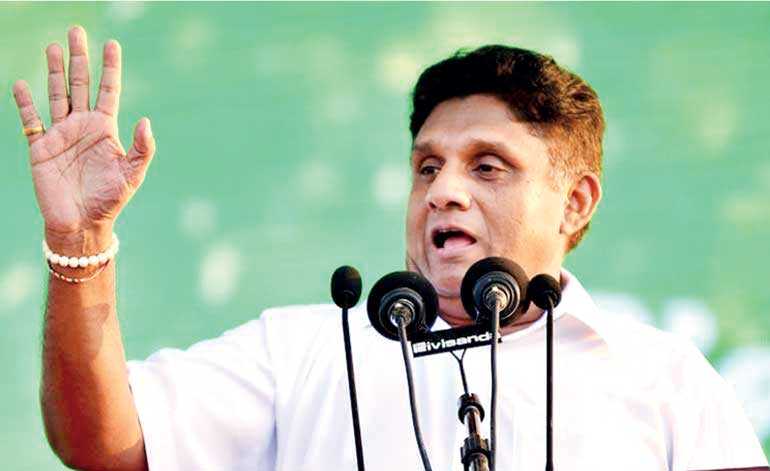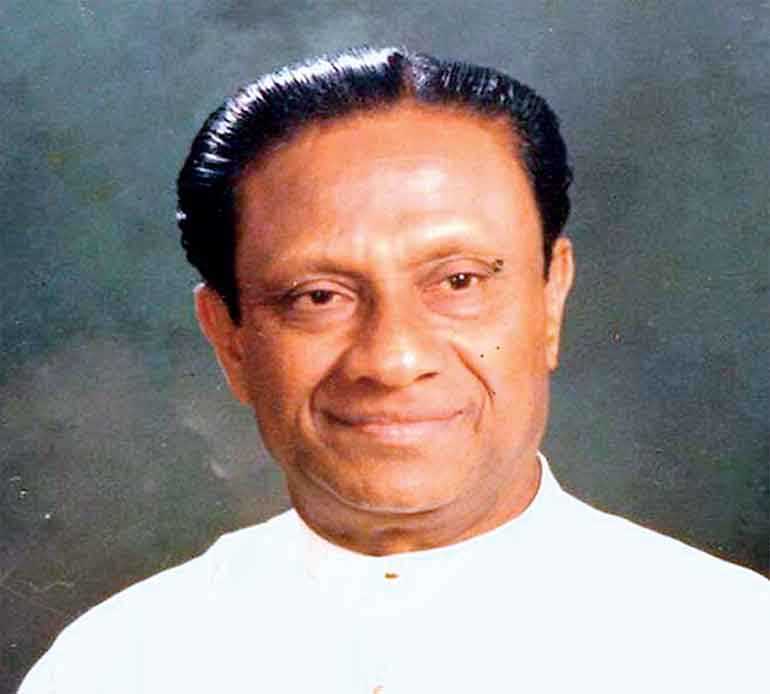Tuesday Feb 17, 2026
Tuesday Feb 17, 2026
Monday, 6 May 2019 00:00 - - {{hitsCtrl.values.hits}}


By Sajith Premadasa
Every suicide bomber has a dream, a fantasy of how their destruction will consummate cataclysmic change. Sri Lanka stamped out such heinous desires once before. Now we are called upon to do so again.
At a May Day rally in 1993, a suicide bomber assassinated my father, President Ranasinghe Premadasa. My father was the second-ever Head of Government to be killed by a suicide bomber. My father’s killer walked up to him and detonated his vest, leaving a cruel circle of death. Just as the blast destroyed 17 lives, it shredded the hearts of 17 entire families, including my own. Nothing can ever fill the void left in the hearts of myself, my mother and my sister, or of the other 16 families who lost loved ones that day, or of the many suicide bombers who have struck since.
These so-called ‘Tamil Tigers’ used suicide bombers without a second thought to slay dozens of lawmakers, including several Tamils. In 2009, our military eradicated the Tigers, relegating them to the dustbin of history. Ever since, Sri Lankans of all ethnicities and religions have lived together in peace and prosperity.
Easter Sunday marked the end of our decade-long respite from terrorism. The so-called ‘Islamic State’ targeted churches and hotels in Sri Lanka, killing over 250 innocent worshippers and tourists while maiming hundreds more in the carnage. Most died instantaneously, while peacefully praying before the altar of their God. As a Buddhist, I find solace in the fact that these tranquil final prayers might serve as blessings in their next lives.
Next month, my father would have turned 95. For the last 26 years of my life, every moment I have cherished or battle I have won has been hollowed by my father’s absence. I know that the future holds similar struggles for the hundreds of mothers, fathers, brothers, sisters, husbands and wives haunted by the final words and smiles of those they lost. In honour of the fallen, we have a duty to seek justice, and prevent further attacks.
Sri Lankans across the board have risen to the occasion. First responders and medical staff risked themselves to save others. Our police and military have already unravelled much of the terror cell, arrested several insurgents, foiled follow-up attacks and saved countless lives. Religious leaders united Sri Lankans of all faiths.
Cardinal Malcolm Ranjith took the lead, rising to the occasion and preventing retaliatory violence by expressing solidarity with the Muslim community. He and local Muslim leaders made crystal clear that there is nothing ‘Islamic’ about the Islamic State. Sri Lanka’s Muslims stand against these barbarians, just as Tamils before them stood against the Tigers. Especially in the shadow of such remarkable leadership, those who launched political campaigns on the back of such a tragedy are willing customers of terror.
History will remember this attack as Sri Lanka’s ‘9/11’. In 2001, al-Qaeda hijackers killed nearly 3000 in the United States, then a country of 285 million. On Easter Sunday, IS bombers killed over 250 in Sri Lanka, a country of just 21 million. Reports emerged that US authorities were warned of the 2001 attacks. Similar reports have emerged that Sri Lankan authorities sat on critical intelligence.
These attacks should spark a paradigm shift in the psyche of our civil service, away from a bureaucratic passing of the buck towards a dynamic culture in which public officials exercise autonomy and accountability. Officials must learn to take snap decisions, not to delegate and delay.
The world’s priority after 11 September 2001 was unity – standing together against those who sought to divide and destroy through violence. Just as NATO declared then that an attack against one nation was an attack against all, the world has rallied around Sri Lanka, offering unprecedented assistance.
The living will judge us by how we avenge the dead and how we honour them. It is essential that we assist those who lost loved ones and care for the injured. They cannot withstand more pain. Whatever they need, we must provide.
Sri Lankans have rallied before, whether rebounding from the 2004 tsunami or becoming the only country in the world to have eradicated terrorism. We must rekindle this unity, set aside our differences and erase ISIS from our country. We will do so.
Sri Lanka’s military and police have never failed us in a crisis. When we stand as one, it is only a matter of time before these terrorists meet the same end that befell Vellupillai Prabakharan and his Tigers.
To those who ask how they can help Sri Lanka, my request is plain. Terrorise the terrorists. They want you to be afraid: afraid of Muslims, afraid of entering churches, temples and hotels, and afraid of countries struck by terror. Deny them your fear. I call on the world to adopt a radical counter-terrorism doctrine to deter future attacks.
Invest in Sri Lanka and other democracies struck by terrorism. Let it be known that every country struck by terror will be strengthened. Leave such countries stronger, economically and politically, than before they were attacked. It is high time terrorists got the message, loud and clear, that the world will rally around every nation they dare to strike, and that fresh attacks will only hasten their demise.
Together, let us show these fanatics that an attack on any country is an attack on every country, that their brutality has no place in the civilised world and that their dreams were doomed to die the instant they resorted to barbarism and mass murder.
The author is a Cabinet Minister and Deputy Leader of Sri Lanka’s ruling United National Party.